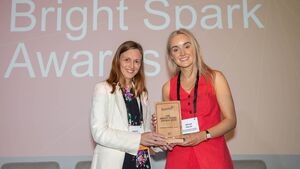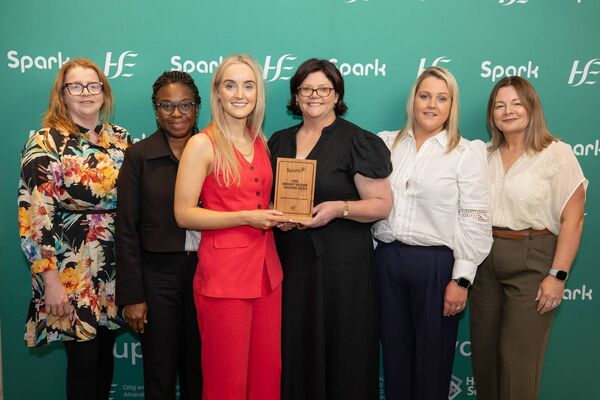Occupational therapist from Waterford recognised for groundbreaking frontline innovation

Megan Walsh, being presented with her award by Sinead Fitzpatrick, Assistant National Lead, Health & Social Care Professions.
Megan Walsh, from the Occupational Therapy Department at University Hospital Waterford, has been recognised for her groundbreaking innovative work.
Ms Walsh received the Best HSCP Led Project award for her project, ‘Occupational Therapy Led Reablement - Promoting Patient Flow’, at the HSE’s annual Spark Summit in Dublin.
Her project was one of 12 innovative solutions to healthcare challenges recognised at the summit.
The event was aimed at celebrating the creativity and ingenuity of frontline healthcare professionals and brought together international experts, policymakers and local innovators to explore latest advancements in healthcare innovation.
A spokesperson for the HSE said the award winners showed some of the ways that using existing resources in different ways, can massively improve processes and reduce pressure on healthcare professionals.
A collaboration between the Occupational Therapy team at University Hospital Waterford and the HSE Home Support Office created a cost-saving, home-based rehabilitation service for patients post-discharge.
Through the collaboration, led by Ms Walsh and funded through the Spark Impact Fund, healthcare assistants were trained to deliver OT-supervised ‘reablement’ therapy in the home.
The service reduced hospital stays by an average of four days, saving 172 acute bed days and 500 rehabilitation/step-down bed days.
Additionally, 95 per cent of patients did not need further home support which freed up resources for those with long-term needs.
“With high patient satisfaction and professional engagement, this model supports better flow, outcomes, and workforce sustainability,” said the HSE spokesperson.
Speaking at the summit, Ms Walsh said: “Our project trained healthcare assistants from home support to deliver a collaborative, person-centred and time-limited rehabilitation service in people's own homes, post-acute hospital discharge.”
“It was designed to ensure patients receive the right care, in the right place, at the right time, reducing hospital length of stay and enhancing patient recovery,” she said.

Ms Walsh also acknowledged the support received from the HSE: “The support and funding we received from HSE Spark was revolutionary for us. It allowed us to redirect healthcare assistant staff for the initiative and access assistive technology such as falls alarms.”
"We also benefited massively from advice around metrics, data collection and scalability – it was truly invaluable,” she said.
Meanwhile, Caitriona Heffernan, HSE Spark Innovation Lead, said: “The Spark Summit is just one day in the year but it represents the culmination of countless hours of dedication, creativity, and collaboration by frontline staff across the health service.”
“It’s an opportunity to honour and recognise their commitment to improving patient care through innovation,” she said.
“It not only celebrates their achievements but also demonstrates the power of face-to-face connection to inspire learning, spark new ideas, problem solving, and strengthen our shared drive to deliver better care across the HSE.”
Minister for Health, Jennifer Carroll MacNeill also spoke at the summit and said: “At a time when our health service is under significant pressure, the HSE Spark Innovation Programme continues to highlight the strength, creativity, and commitment of our frontline workers.”
She said the initiative supports and mentors healthcare professionals to develop meaningful improvements, grounded in their day-to-day experience and close connection with patients and service users.
“It’s a reminder that even in challenging times, positive change is possible when we support and invest in those delivering care on the ground,” she said.






